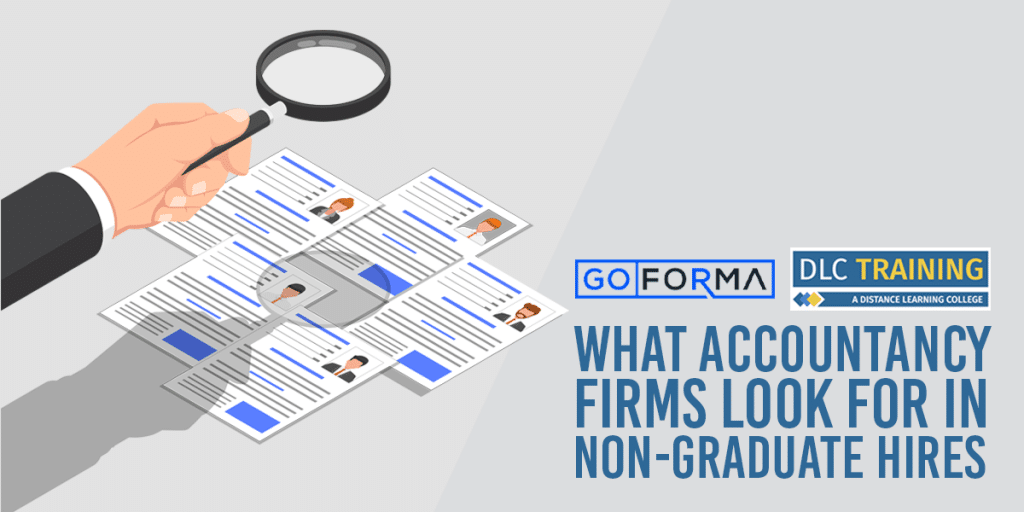
You do not need a degree to get into accounting.
This is especially true if you are looking to work for smaller accounting firms who tend to hire one at a time rather than in large cohorts.
Here we will go through the non-degree-based pathways to get into accounting and explain what I, the Co-Founder of accounting firm GoForma look for in non-graduate hires.
What Qualifications Do I Need To Get Into Accounting?
Before I talk about qualifications, you should understand that accountancy is an industry comprising many different roles rather than just one job.
When someone says they are “an accountant” they generally mean that they are a Chartered Accountant. This is a legally protected job title (like a medical doctor) and I will talk about how to become one later on (you’ll need to have all the AAT qualifications to become one in absence of a degree).
Anyway, onto the qualifications.
Accountancy qualifications were created by the Association of Accountants (AAT). The AAT has three specific accounting qualifications. They are:
| Qualification | Who it is for | What it entails | What jobs you can get from it |
|---|---|---|---|
| AAT Level 2 Certificate in Accounting | Someone with no accounting experience | Four units assessed by exams | Accounts Assistant
Trainee Finance Assistant Accounts Payable Clerk |
| AAT Level 3 Diploma in Accounting | Someone with at least one year in an accounting role | Four units assessed by exams | Credit Controller
Assistant Accountant Audit Trainee |
| AAT Level 4 Professional Diploma in Accounting | Someone with at least one year in an accounting role and who has completed the AAT Level 3 Diploma | Three mandatory units and two optional units all assessed by exams | Cost Accountant
VAT Accountant Payroll Manager Assistant Financial Accountant Tax Supervisor Fixed Asset Accountant |
DLC Training offers some of the most flexible study options in the UK, meaning that you can gain these qualifications alongside full time employment.
What About Apprenticeships?
You can gain all AAT qualifications through on the job training via an apprenticeship.
These are paid (although the minimum wage for an apprentice is £6.40 an hour rather than the standard £11.44 an hour) and you will still have to pass the same exams as you would through classroom based learning. AAT Apprenticeships tend to last 12-15 months.
AAT apprenticeships are competitive to get onto, and generally require you to have A levels.
You can make yourself a stronger candidate for these apprenticeships through completing the AAT Level 1 Award in Bookkeeping and the AAT Level 2 Certificate in Bookkeeping which will teach you the fundamentals of what you’ll likely be working on during your apprenticeship.
DLC Training offers both these Bookkeeping courses.
What Do Employers Look For in Accounting Candidates?
In addition to AAT Qualifications our company looks for the following in accounting candidates (please note this is listed in order of importance):
- Relevant experience: Previous accounting experience is ideal, but any role which involves tracking and managing a company’s income and expenditure will make you a stronger candidate. An example of this could be managing your team’s hours and pay in a hospitality management role.
- A proactive mindset: The best way to demonstrate this is to get yourself in front of a hiring manager before you apply for a role. LinkedIn, email and the phone are all channels to do this. Approaching hiring managers with the question: “I don’t have a university degree, will this count against me and if so then what can I do to make up for this?” is a good excuse to demonstrate a proactive mindset.
- Good Excel skills: Although accounting positions often use bespoke accounting software, these tend to boil down to Excel with a fancier user interface. Excel tests are often used in accountancy job applications, so you’ll want to at least be able to do basic VLOOKUPS and understand how to create pivot tables.
- Customer service skills: Assistant accountants often deal with client enquiries, so previous customer service skills (especially over the phone and email) is a real bonus.
What If I Want to Become A Chartered or Management Accountant?
A Chartered Accountant is a globally recognised qualification and job title.
It’s one of the most in demand qualifications for big employers in the world and can lead to a very lucrative career.
Becoming a Chartered Accountant is not easy though. You need to pass the ACA, a qualification from the Institute of Chartered Accountants in England and Wales.
This involves passing 15 exams on top of demonstrating 450 days working in an accounting based role. It usually takes 3-4 years to complete and is meant for people who already have several years of accounting work experience under their belts.
My recommendation would be to talk to your employer about how they can support you through the ACA once you have worked with them for at least two years in a midweight (non-entry level) role.
Final Thoughts
You do not need a degree to have a successful career in accounting, however without a degree you will need to pass the AAT accountancy qualifications, all of which are available from DLC Training.
In addition to qualifications any demonstrations of experience managing a company’s income and expenditure (no matter how trivial the degree of that experience) should make you a strong candidate in the accountancy job market.
Author: Charlie Bailey, Co-founder of GoForma